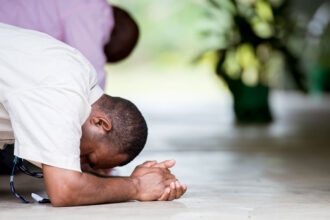- 1 Samuel 12: 12-24
- 1 Timothy 2:1-10
Instructions on Worship
“I urge, then, first of all, that petitions, prayers, intercession and thanksgiving be made for all people— for kings and all those in authority, that we may live peaceful and quiet lives in all godliness and holiness. This is good, and pleases God our Savior, who wants all people to be saved and to come to a knowledge of the truth. For there is one God and one mediator between God and mankind, the man Christ Jesus, who gave himself as a ransom for all people. This has now been witnessed to at the proper time. And for this purpose I was appointed a herald and an apostle—I am telling the truth, I am not lying—and a true and faithful teacher of the Gentiles.

Therefore I want the men everywhere to pray, lifting up holy hands without anger or disputing. I also want the women to dress modestly, with decency and propriety, adorning themselves, not with elaborate hairstyles or gold or pearls or expensive clothes, but with good deeds, appropriate for women who profess to worship God.
Subject: A special call to all Christians for prayers:
- To pray for all Nation leaders.
- Paul begins this chapter by urging that “supplications, prayers, intercessions, and thanksgivings be made for everyone, for kings and all who are in high positions” (1 Tim. 2:1–2).
- The aim of this prayer is that Christians “may lead a quiet and peaceable life in all godliness and dignity” (1 Tim. 2:2).
- Presumably, these first-century rulers had the power to make life difficult and disruptive for Christians.
- So Paul urges Christians to pray for their civic rulers.
- Prayer, peace, and order are Christians’ first instruments of engagement with the secular world.
- Christians should be praying for all of those who are in their particular workplace, especially those who have supervisory roles “in high positions.”
- Christians should strive to do their jobs without disrupting the work of others, without calling undue attention to themselves, and without constantly challenging authority—in other words, working “in all godliness and dignity” (1 Tim. 2:2).
- Christians should strive to do their jobs without disrupting the work of others, without calling undue attention to themselves, and without constantly challenging authority—in other words, working “in all godliness and dignity” (1 Tim. 2:2).
- Christians should strive to do their jobs without disrupting the work of others, without calling undue attention to themselves, and without constantly challenging authority—in other words, working “in all godliness and dignity” (1 Tim. 2:2).
- For Christians, this kind of peaceable and submissive behavior is not motivated by fear, people-pleasing, or social conformity, but by a healthy appreciation for the order God has established and by a desire for others to “come to the knowledge of the truth” (1 Tim. 2:4).
- As Paul says elsewhere, “God is a God not of disorder but of peace” (1 Cor. Does this conflict with the duty to be at the forefront of shaping the mission and core values of our workplaces? Some Christians try to shape missions and values through confrontation around controversial issues, such as same-sex partner benefits, health insurance exclusion for abortion and/or contraceptives, union organizing, display of religious symbols and the like. If successful, this approach may help shape the mission and value of the organization. But it often disrupts others’ work, breaks the peace, and disrespects supervisors’ authority.
Some say that God loved the world (Jn 3:16) but chose to save only some according to his purpose in election (Ro 9:11; see Ro 9:15–16)
- To pray in due holiness.
- [3] The church is—or should be—ordered according to God’s way. Few would dispute that.
- But should other organizations also be ordered according to God’s way?
- The first-century Greco-Roman world believed that society should be ordered according to “nature.”
- Thus if nature is the creation of God, then God’s way of ordering creation should be reflected in the way society is ordered as well.
- The structures of the oikos (household) and the ekklēsia (church) are not only continuous with each other, but both are parts of the dispensation [administration] of God in the world.”
- [4] Workplaces, households, and churches all reflect the one and only ordering of creation.
- Holiness is a call to all Christians who proclaim Christ as a savior.
- Here men are called to lift up their hands in worship as a sign of total commitment and an indication of yielding totally to the leading of the Holy Spirit.
- Why lift hands? Because many men are evil; use hands to get riches unlawfully. Some kills, rob. Use the same hands to fight, both their family members and neighbors as well as workmates, fellow Christians.
- Others uses the same hands to molest other men’s wives and young ladies, smoke and even eating unholy foods in the dark.
Paul is urging them that they must repent all of their iniquities before they lead any church service during the worship time. Tell it all to God before you get into the most holy place for worship, take the bible and read, give any church sacrifice. It’s a mandatory.
This was the common prayer posture in Judaism and early Christianity. See why did David lift up his hands to worship God? (Ps 63:4).
- To pray through Christ Jesus.
- In His teaching on prayers Jesus said that our prayers should be directed to His father in heaven.
- He knew that Our Father in heaven is the source of all needed by humanity for their survival.
- Paul here is introducing Christ as the only mediator between God and man. A mediator always mediate between two people to bring cohesion and peace.
- A mediator is a reliable individual who pray a very vital role in a broken relationship; because he is always a friend to both.
- WE have been having mediators in our relationships; be it at home, church and places of work as well as in this country.
- Couples disagree, government officials and great leaders disagree, and parent disagree with their siblings and so on.
- Church leaders do disagree as well and entertain chaos and spiritual disorders among worshippers, to an extent of worshippers dividing who to follow in the church.
- Fake mediators have been seen doing fanny initiatives. Others acting to be Jesus; and yet people are following them and believing in their doctrines which takes them nowhere.
- They have introduced a lot literatures and ornaments to their followers so as to blind them to turn away from Christ Jesus and follow them as if they are fools.
- Paul calls them foolish, bewitched people, who started in spirit but ended in fresh, people were once lead by the spirit of God but ended up being led by their own fresh desires.
Let us all turn to Christ who will mediate on our behalf so as to find pardon from God and even find solace in Him only.
The problem, as most see it, was not the style but the distraction. In the Ephesian church, extravagant clothing, hairstyles and…

What is needed instead is a more personal, deeper, and more respectful engagement of organizational culture. Rather than clashing over health benefits, could Christians invest in friendships with co-workers and become a source of counseling or wisdom for those facing major life decisions? Instead of pushing the boundary between freedom of speech and harassment, could Christians do their assigned work with such excellence that co-workers ask them to explain the source of their strength?
Instead of arguing about peripheral issues such as holiday decorations, could Christians help improve the core activities of their workplaces, such as job performance, customer service, and product design, and so earn the respect of those around them? In answering such questions, we can remember that Paul’s advice to Timothy is balanced, not self-contradictory. Live in peace and cooperation with those around us. Seek to influence others by serving them, not trying to lord it over them. Isn’t that what the King of kings did?
Conclusion:
Christians have been called into this noble responsibility of praying to our national leaders so that they may know God in their services and turn to him for salvation, embrace peace and promote unity in the country. From the MCAs to the President, both the government and the opposition without ceasing. How many time do we pray for our leaders in our daily prayers or weekly fellowship? Or what we do best is to criticize poor governance even when there is no meaning?
All ladies are called to decency and holiness in serving God without taking much time on themselves especially on beauty. How many times do we serve God with our holy hands and heart or we only dress to kill, to attract and to be praised by men… Dress, hair styles and strong perfumes and cool manicure/pedicures. God is watching us. Men wash your hands as you serve the lord so that our supplication and worship will reach to God as a pleasing aroma because of our commitment to serving him always.
Prayers should be directed to God; the maker and sustainer of our lives. Should be done in and through Christ Jesus as our one and only mediator between God and man. Where do you direct your prayers to? And in whose name do you pray?
Manley Beasley. “We only learn to behave ourselves in the presence of God.”








